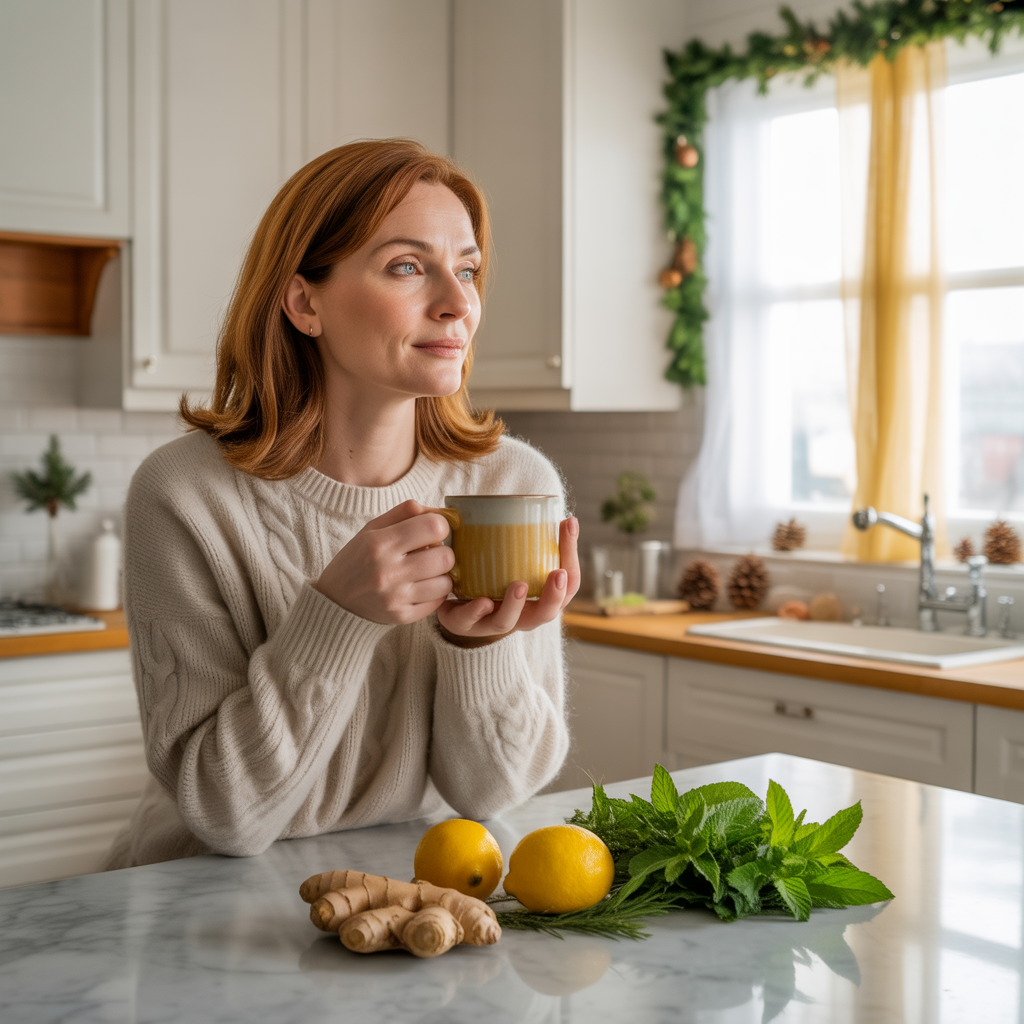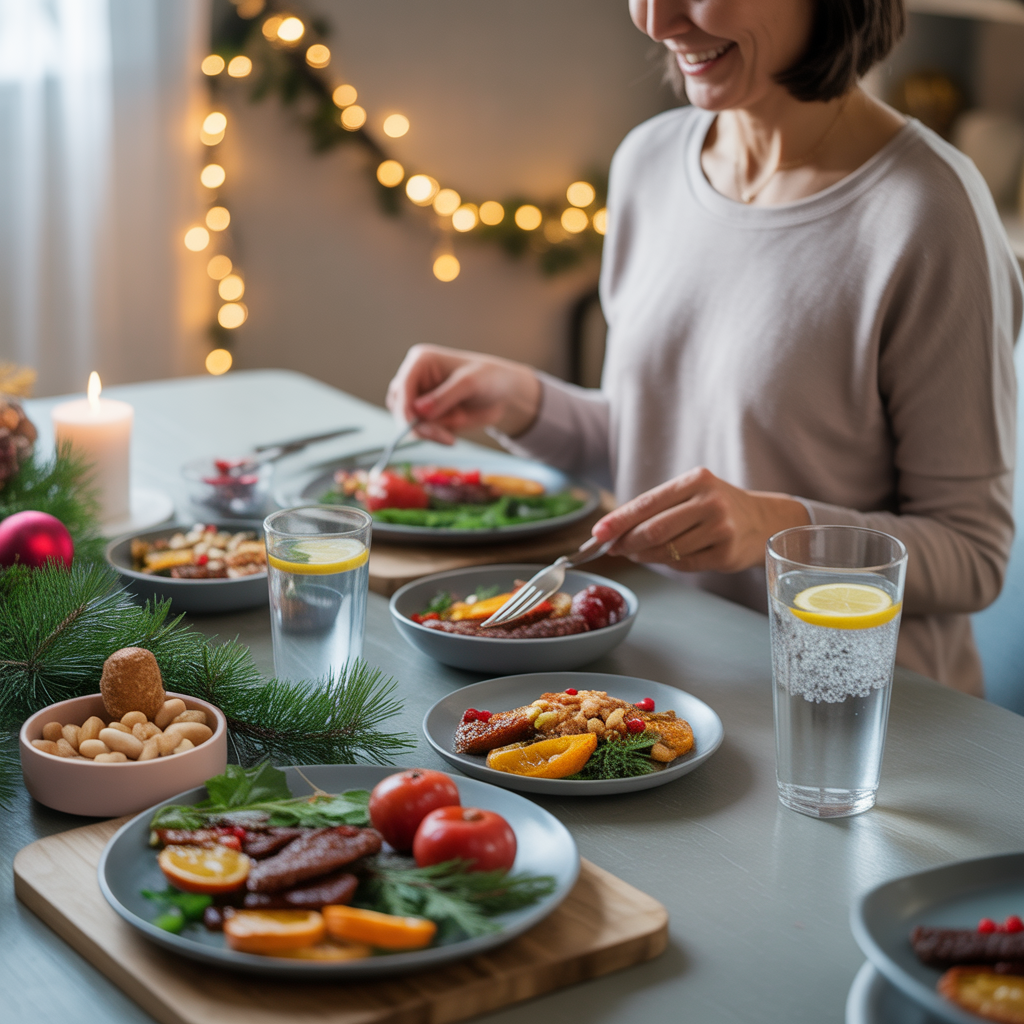The Holiday Bloat Trap: Why You Feel Miserable After Meals
Holiday feasts shouldn’t leave you miserable. Here’s why bloat hits—rich foods, salt, stress, and speed—and the simple fixes that work: smart pre-meal prep, mindful portions, soothing teas, gentle movement, and 12 bloat-calming foods to keep your gut happy so you can savor the season.

Have you ever wondered why you feel so uncomfortable after holiday meals? I'm sure I am not the only one who has experienced the dreaded holiday bloat.

When I enjoy my favorite holiday dishes, I often feel bloated and uncomfortable. It's a common problem many of us face during the holiday season.
So, what's behind this discomfort, and more importantly, how can we alleviate it? In this article, we'll explore the causes of holiday bloat. We'll also discuss some effective ways to manage it, including certain foods that can provide relief.
Not sure if your symptoms point to gut issues? Start with my quick checklist: 8 Signs You Might Be Suffering from Poor Gut Health
The Holiday Digestive Nightmare
The holiday season is here, and so is the digestive discomfort we all fear. We enjoy rich, festive foods, but our stomachs often suffer. It's a common problem during these times.
That Post-Feast Feeling We All Dread
Who hasn't felt bloated after a big holiday meal? It's like our stomachs are saying, "No more!" This discomfort comes from eating too much and stress from holiday gatherings.
Beyond Bloating: The Full Spectrum of Holiday Tummy Troubles
Bloating is just the start. Many face heartburn, indigestion, diarrhea, and constipation during holidays. Stress and routine changes make these problems worse.
Why This Year Will Be Different (I Promise!)
This year, I'm here to help you enjoy the holidays without stomach pain. By knowing what causes these problems and using simple fixes, you can have a great time. Let's find ways to keep your stomach happy and healthy during the holidays.
What's Really Happening Inside Your Gut
As we dive into the holiday season, our digestive systems often become the unintended victims of our festive feasting. The abundance of rich, savory, and sweet dishes can wreak havoc on our guts, leading to discomfort and distress.
Understanding the science behind these digestive issues is key to lessening their impact. Let's explore the factors at play and how we can enjoy the holiday season without sacrificing our digestive health.
The Science of Bloating: It's Not Just In Your Head
Bloating is a common complaint during the holidays, but it's more than just a psychological response to overeating. It's a physiological reaction to the foods we consume and how our bodies process them.
When we eat foods that are high in sugar, salt, and unhealthy fats, our bodies retain water, leading to bloating. The digestion process can also be slowed down, allowing gas to build up in the digestive tract.

Holiday Food Villains: The Worst Offenders
Some holiday foods are more likely to cause digestive issues than others. Here's a breakdown of the most common culprits and their effects on our digestive systems:
| Food | Why It's a Problem |
|---|---|
| Turkey | High protein content can be difficult to digest, making it hard when overcooked. |
| Mashed Potatoes | High in carbohydrates, which can be fermented by gut bacteria, producing gas. |
| Stuffing | Often contains a mix of high-fiber ingredients and spices that can irritate the digestive tract. |
How Stress and Overeating Create the Perfect Storm
Stress and overeating are a potent combination that can exacerbate digestive issues. When we're stressed, our bodies release hormones that can slow down digestion, making us more susceptible to discomfort.
Overeating, during the holidays, can put additional pressure on the digestive system. This leads to bloating, cramps, and other issues. By understanding these factors, we can take steps to mitigate their impact and enjoy the holiday season with greater comfort.
My Top 12 Foods That Help Reduce Bloat
I've found 12 foods that make holiday meals more enjoyable. These foods help with digestion and can be added to your holiday meals.
Daily helper I use during busy seasons: 3 Mushroom Blend (turkey tail, cordyceps, lion’s mane) for caffeine-free energy, mental clarity, immune support, and gut health
Ginger and Peppermint: Nature's Digestive Soothers
Ginger and peppermint are great for your stomach. Ginger fights inflammation and eases nausea. Peppermint relaxes stomach muscles.
I start my day with ginger tea or add fresh ginger to my food.
Yogurt and Kefir: Probiotic Powerhouses
Yogurt and kefir are full of good bacteria. They keep your gut healthy and reduce bloating. I add yogurt or kefir to my breakfast.
Cucumber and Celery: Hydration Heroes
Cucumber and celery are full of water and fiber. They help flush out toxins and keep digestion smooth. I snack on them with hummus.
Pineapple and Papaya: Enzyme-Rich Digestive Aids
Pineapple and papaya have enzymes that help digest food. Pineapple breaks down proteins, and papaya aids digestion. I add them to desserts or snacks.
Fennel and Bananas: Gas-Fighting Champions
Fennel fights gas and bloating. Bananas are easy to digest and stabilize digestion. I snack on bananas and add fennel to meals.
Avocado and Oats: Fiber-Friendly Belly Tamers
Avocados and oats are full of fiber. They regulate bowel movements and reduce bloating. I eat avocado and oatmeal to stay regular.
Here's a summary of the 12 foods and their benefits in a tabular format:
| Food Category | Foods | Benefits |
|---|---|---|
| Digestive Soothers | Ginger, Peppermint | Reduce nausea and alleviate bloating |
| Probiotic Powerhouses | Yogurt, Kefir | Support gut health |
| Hydration Heroes | Cucumber, Celery | Flush out toxins and hydrate |
| Enzyme-Rich Digestive Aids | Pineapple, Papaya | Aid protein digestion and reduce bloating |
| Gas-Fighting Champions | Fennel, Bananas | Reduce gas and stabilize digestion |
| Fiber-Friendly Belly Tamers | Avocado, Oats | Regulate bowel movements and reduce bloating |
How to Incorporate These Foods Into Holiday Meals
Adding these foods to your holiday meals is easy and tasty. Start with a ginger appetizer or use yogurt sauces. Add cucumber and celery to salads or use them with hummus.

Making smart food choices during the holidays can reduce bloating. I hope these tips help you enjoy your meals without discomfort.
Holiday Eating Strategies for Happy Digestion
As the holiday season comes, I've learned how to enjoy big meals without feeling bad. I've found ways to handle holiday eating easily.
Before the Feast: My Pre-Game Digestive Prep
Preparation is key to avoid a bloated stomach during holidays. I drink lots of water before big meals. This helps my body digest the rich foods.
I also take probiotics a few days before big gatherings. This keeps my gut healthy and reduces discomfort. I eat a light meal a few hours before to avoid overeating.

During Dinner: Mindful Eating Techniques That Actually Work
Mindful eating helps me enjoy holiday meals without discomfort. I focus on the flavors, textures, and smells of my food. This makes me enjoy it more and eat slower.
I control my portions by eating smaller amounts and only going back for seconds if I'm really hungry. This prevents overeating and eases my digestive system. I also avoid foods that make me bloated or uncomfortable.
After the Meal: My Personal Rescue Remedies
Even with good preparation and mindful eating, sometimes I feel uncomfortable. When this happens, I use a few trusted remedies. A warm cup of peppermint tea soothes my stomach. Taking a short walk after eating also helps.
For more serious issues, I use digestive enzyme supplements. They help break down complex foods that cause bloating and gas. With these strategies, I can enjoy holiday food without digestive problems.
Enjoying Holiday Meals Without Paying the Price
The holiday season is here, and it's tempting to overindulge. But, we don't have to sacrifice our digestive health. By choosing the right foods and strategies, we can enjoy our meals without feeling bloated.
I've shared 12 foods that help reduce bloating, like ginger and yogurt. I've also given tips for healthy holiday eating. With a little awareness and adjustment, we can avoid bloating and savor our meals.
To keep our digestion healthy, we need to take action. Preparing our stomach before eating, eating slowly, and using remedies after can help. These steps ensure we enjoy the holidays without digestive discomfort. Follow these tips to prevent bloating and keep your digestion healthy all season.
FAQ
What are some common causes of a bloated stomach during the holidays?
Overeating and eating high-sodium or high-fiber foods can cause bloating. Drinking carbonated drinks and eating too quickly also play a role.
How can I prevent a bloated stomach during holiday meals?
Eat smaller portions and choose low-sodium, low-fiber foods. Avoid carbonated drinks. Mindful eating and a short walk after meals can also help.
What are some foods that can help reduce bloat?
Foods like ginger, peppermint, and yogurt can help. So can cucumber, celery, and pineapple. Papaya, fennel, bananas, avocado, and oats are also good choices.
Are there any specific holiday foods that I should avoid to prevent bloating?
Yes, avoid beans, cabbage, broccoli, onions, and carbonated drinks. Limit foods high in salt and sugar too.
How can I incorporate bloat-reducing foods into my holiday meals?
Add ginger to your holiday punch. Serve yogurt or kefir as a side. Snack on cucumber and celery. Try digestive-friendly desserts like pineapple or papaya sorbet.
Can stress really make my bloating worse?
Yes, stress can make bloating worse. Stress triggers your body's "fight or flight" response, slowing digestion. Stress-reducing techniques like deep breathing or meditation can help.
What are some mindful eating techniques that can help with digestion?
Eat slowly and savor your food. Pay attention to your hunger and fullness cues. Avoid eating on the go or in front of screens. Eat with others to make mealtime more enjoyable.
Affiliate Disclaimer
This blog may contain affiliate links, which means I may earn a small commission if you click on a link and make a purchase—at no extra cost to you. As an affiliate, I only recommend products that I personally use, trust, and believe will add value to my readers. Your support helps keep this content free and allows me to continue sharing helpful tips and resources.
I am not a medical professional, and the information provided on this blog is for educational and informational purposes only. Always consult with a qualified healthcare provider before making any changes to your skincare or wellness routine.